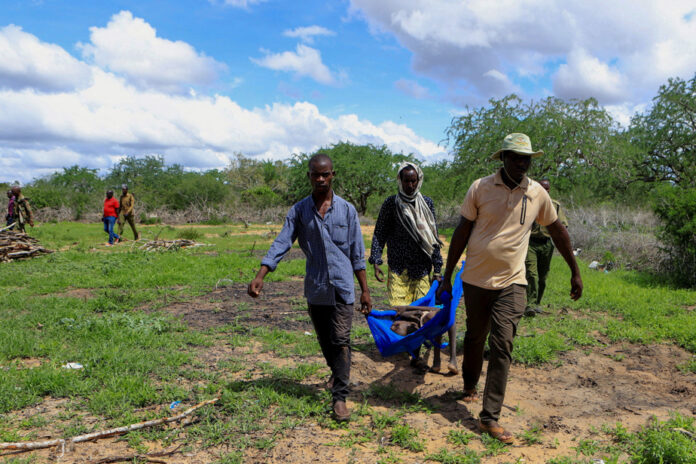(Malindi) The macabre count continues in the Shakahola forest, in eastern Kenya: ten new bodies of suspected members of a sect advocating extreme fasting were found on Tuesday morning, noted an AFP journalist.
These new findings bring the death toll from what is now called the “Shakahola Forest Massacre” to 83.
Monday evening, police sources reported 73 deaths since the search began on April 14. On Tuesday morning, an AFP reporter on the spot saw five new bodies wrapped in blue body bags, while five others — including those of three children — were being pulled from a shallow mass grave.
Two survivors with severely emaciated bodies were also found, he found.
This case arouses horror and indignation in this East African country.
President William Ruto on Monday called a “terrorist” the “pastor” of this group called Eglise Internationale de Bonne Nouvelle (Good News International Church), Paul Mackenzie Nthenge, who advocated fasting to meet Jesus.
Mr Ruto promised tough action against those “who want to use religion to advance a shady and unacceptable ideology”.
Investigators are looking for dozens of mass graves in a vast forest area of 325 hectares, located not far from the coastal town of Malindi.
Faced with the influx of bodies, the Malindi sub-county hospital morgue is full, hospital administrator Said Ali told AFP.
“The hospital morgue has a capacity of 40 bodies,” he said, saying the Red Cross had been asked to provide refrigerated containers.
At least 31 survivors have also been found and hospitalized since the search began, according to the police.
“With each passing day, there is a very strong possibility that others will die,” Hussein Khalid, the executive director of the NGO Haki Africa, which had alerted the police to the actions of the Church, told AFP. Good News International.
“The horror we have seen over the past four days is traumatic. Nothing prepares you for shallow graves containing children,” he added.
An investigator told AFP that up to six people were buried in the same grave, while other bodies were found on the ground.
According to the Kenya Red Cross, 212 people have been reported missing at its on-site tracing office.
Interior Minister Kithure Kindiki is expected at the search site on Tuesday.
This case raises many questions about flaws on the part of the police and judicial authorities, who had known the implicated “pastor” for several years.
A former taxi driver who started his church in 2003, Paul Mackenzie Nthenge was arrested in 2017 on charges of “radicalization” for advocating not putting children in school, saying education is not recognized in the Bible.
He was arrested again in March after two children starved to death in the care of their parents, who then buried them. He was released on bail of 100,000 Kenyan shillings (about $1,000).
He is in custody after turning himself in to police on April 14, after a search began in Shakahola Forest. He appeared in court the following day, and is due to be heard again on May 2.
The scandal has also rekindled the debate over the control of cults in Kenya, a predominantly Christian country, where “pastors”, “churches” and other marginal religious movements make headlines.
Mr. Kindiki said on Sunday that this massacre must lead to “not only the most severe punishment for the perpetrator(s) of the atrocity…but also stricter regulation (including self-regulation) of every church, mosque, temple or synagogue in the future”.


















